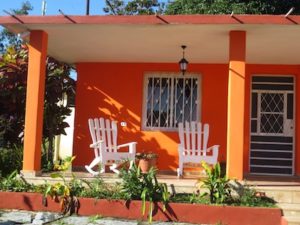I’ve recently spent a month in Cuba. It’s a fascinating country, and most people visit as part of a tour. I’ve enjoyed tour groups in the past, but I enjoy travelling independently – finding my way about on local transport and sorting my own accommodation. I’d thought this would be fairly easy in Cuba. After all, it’s not like the Far East where I can’t read the script. I don’t speak much Spanish, but at least I can read maps and understand directions. Besides, I could organise most of it on the internet, couldn’t I? If only. Cubans are not permitted to use the internet unless they can prove they need it for business or educational use. There are banks of computers in outlets known as Etecsas – so even those with permission cannot be unsupervised. In order to meet the needs of independent travellers Cuba has evolved a wonderful system of bed-and-breakfast homestays known as Casas Particulares. Homeowners with a spare room are licensed to offer accommodation to tourists, and they are expected to provide a clean place to sleep, hot water, and a private bathroom. But none of the owners have access to the internet. So how do you find one? There are several websites listing casas – with an address and telephone number. (I used www.mycasaparticular.com/en/). The sites provide addresses and telephone numbers and the visitor is expected to ring up. Which is fine for those who speak Spanish, but I had no chance of making myself understood without the help of sign language. So I found the first casa by sending an email to the website, and they found someone with a free room when I needed it – the process took several nail-biting days, as the site-owner had to attend to emails only when she could get to an Etecsa. I was in Havana with a bus ticket to Camaguey and no idea if I’d have somewhere to sleep when I got there. But got sorted, and I was ‘in the system’. With the first casa booked, things were much more straightforward. The first landlady telephoned to her friends in next town, who organised me somewhere to sleep and someone to meet me off the bus. The second landlady phoned the third … and so on. Which surely meant my accommodation problem was solved? Except I was not in a position to pick and choose. The first casa was basic, but the couple who ran it so wonderfully kind (they were unfazed when I arrived at midnight) I forgave them everything. The second began well … but then I had to move to another room, off the kitchen, from where I could hear all the family’s to-ings and fro-ings while sitting on my bed, which felt a bit odd. They sent me to a kind woman with a lovely room off a courtyard … you get the picture. I was fine until I arrived in Cienfuegos, where I was met from the bus by a tall, cadaverous man with no teeth. He took me to his home and introduced me to his wife, who was less than five feet tall, also without teeth but with whiskers. She insisted on kissing me, and became obsessive about my hair – every time I passed her she’d stroke it. She was also insistent that I should visit the cemetery (I’m sorry to say I lied and told her I’d been, just to stop her going on about it). My room had crumbling plaster and the door was rotten at the bottom. The chair might, at home, have been described as ‘distressed’ but to me it just looked miserable. But, on my own, the thought of marching out with my suitcase and walking the streets looking for somewhere else defeated me. When I left for Viñales I was determined I’d be assertive and refuse to stay somewhere so difficult. I’d not put up with a crumbling room and such strange people. All the way there, on the bus, I practised my assertiveness. I’d insist I’d met friends, or found something else, and walk away. I was met by a swarthy man with no English at all but rattled on hopefully in Spanish as if the faster he spoke the more likely I was to understand. He led me past some lovely casas in the centre of the town, past some poorer homes towards the outskirts. I was increasingly anxious, my ‘I’m sorry I’ve changed my mind’ words swimming round in my head. And then he pointed up a little rise. ‘Mi casa,’ he said. And then I died and went to heaven. For there was a beautiful cottage, with orange walls, and four rocking chairs in the front porch. Somehow the system – haphazard as it is – had kept the best till last.








